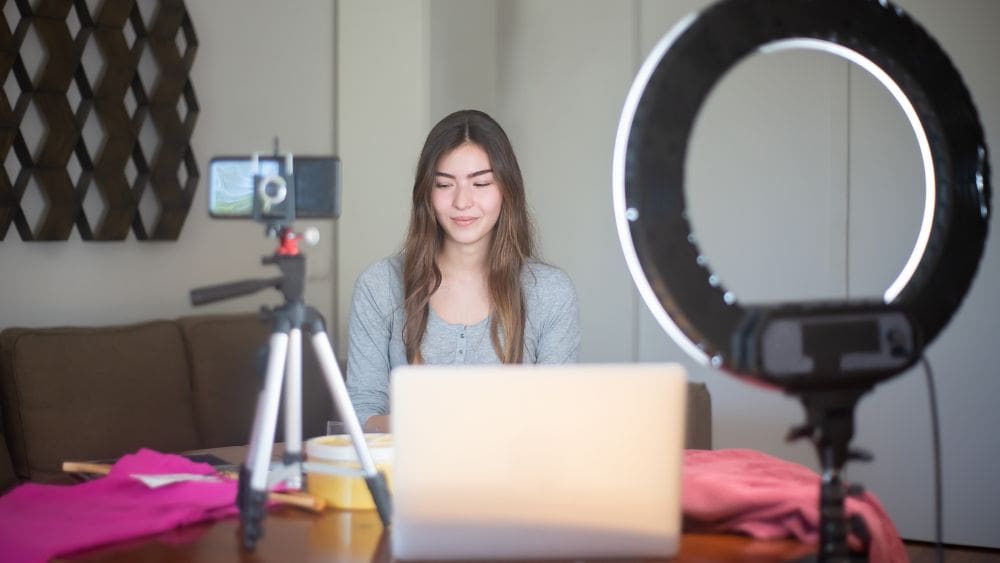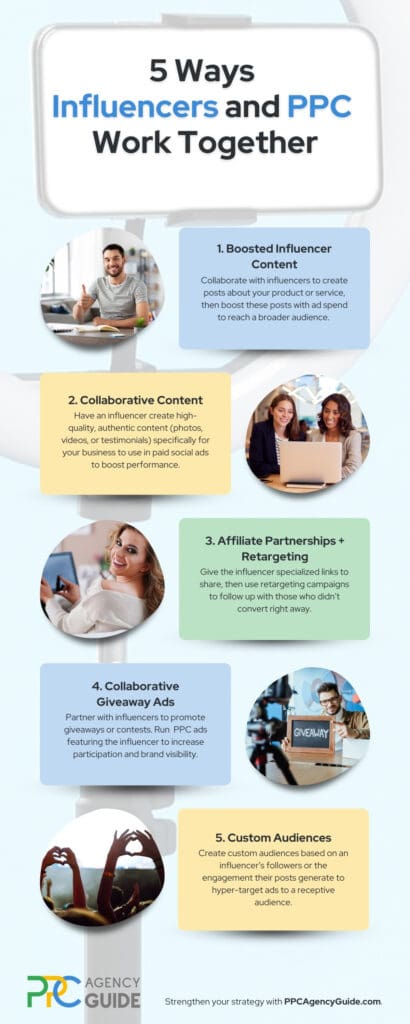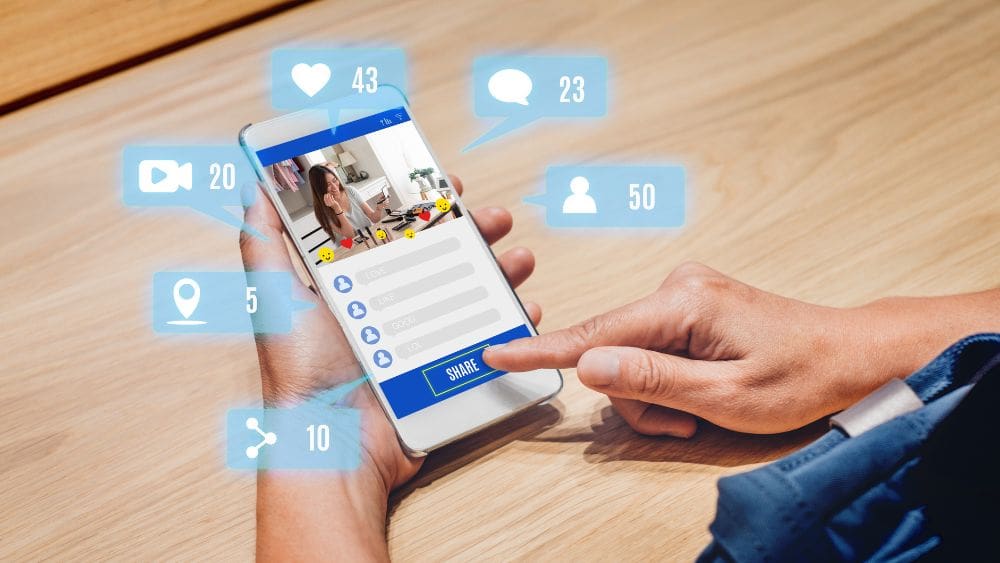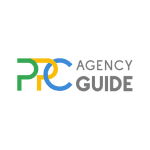
What if you could reach your audience with a personalized message that feels like it’s coming from a friend? Imagine how a viewer would feel as someone they already know and trust introduces them to your products or services. A pay-per-click (PPC) campaign like that resonates on a whole different level. It’s not just about getting clicks anymore—it’s about building the foundation for lasting relationships. That’s the power of using social media influencers in PPC campaigns. This guide will show you how to make it happen.
PPC Strategies with Influencers: How Influencers and PPC Work Together
PPC campaigns with influencers are often seen through a narrow lens, but there are lots of different PPC tactics using influencers to choose from. Familiarizing yourself with the different strategies can help ensure you’re maximizing the value of your influencer relationships and developing campaigns that genuinely engage your audience. Below, we’ll explore a few different approaches.
Boosted Influencer Content
This strategy starts with an influencer creating an organic post about your product or service. Once the post is live, you boost it using ad spend to reach a larger audience, targeting specific demographics and interests.
For example, a healthcare company might partner with a wellness influencer who shares a Facebook post about using their telemedicine app. The company boosts the post to target busy professionals aged 25 to 40 interested in convenient healthcare solutions.
Collaborative Content for PPC Ads
With this strategy, influencers create custom content specifically for your PPC campaigns. This could be anything from testimonial videos to engaging lifestyle photos that showcase your product or service. Unlike organic posts, the content is designed for paid ads and often optimized for platform-specific performance.

For example, a construction equipment manufacturer might work with a construction industry influencer to create a testimonial video highlighting the durability of their tools. The video is then used in LinkedIn Ads targeting construction professionals and procurement managers.
Alternatively, a food services company might partner with a culinary influencer to create a recipe video featuring their signature spice blend. The brand then uses the video in Amazon Ads targeting shoppers browsing similar products, driving traffic to their product listing and increasing sales.
Affiliate Partnerships + Retargeting
In this strategy, influencers promote your product or service using unique affiliate links or discount codes in their posts. This drives traffic to your website while tracking which sales originated from the influencer. PPC comes into play with retargeting ads that target users who clicked the link but didn’t convert.
For instance, a retail company could partner with a fashion influencer on X (formerly Twitter). The influencer tweets a link to an exclusive sale, driving traffic to the retailer’s site. Retargeting ads on Instagram and Google then follow up with users who viewed items but didn’t purchase, encouraging them to complete their orders.
Collaborative Giveaway Ads
This strategy involves working with an influencer to co-host a giveaway or contest. The influencer shares a post or video announcing the giveaway, and PPC ads amplify the campaign to reach a larger, targeted audience. These ads can drive participation while introducing your brand to potential customers.
For example, a travel and tourism company might collaborate with a lifestyle influencer to promote a contest for a free weekend getaway. The influencer then posts scenic videos of the destination, while the company runs Facebook Ads targeting couples aged 30 to 50 who are interested in romantic getaways.
Custom Audiences
This strategy uses data from an influencer’s audience or engagement to create hyper-targeted ad campaigns. Social platforms like Facebook and Instagram allow you to build custom audiences based on the people who interacted with the influencer’s posts or content. These audiences can then be targeted with PPC ads that align with their interests or behaviors.
For instance, a business and professional services firm might collaborate with a LinkedIn influencer specializing in leadership training. The firm then uses LinkedIn’s audience insights to create a custom audience based on the influencer’s followers, who are HR managers or executives. PPC ads are then shown to this group, promoting a free leadership webinar.
Benefits of Influencers in PPC Campaigns
No matter what digital marketing tactics you’re leveraging, you must be able to make a business case for your investment. Influencer PPC ads deliver here, too. Let’s take a quick look at some of the benefits.
Enhanced Credibility and Trust
Collaborating with social media influencers can significantly enhance your brand’s credibility and trustworthiness. Consumers often view influencers as relatable and authentic, making their endorsements more impactful than traditional advertising. In fact, 77 percent of consumers prefer content from influencers over professionally scripted ads, according to IZEA.
Targeted Reach
Partnering with social media influencers enables your business to reach specific, engaged audiences that align with your target market. Influencers often have dedicated followers within particular niches, allowing for precise audience targeting.
Higher Engagement Rates
Partnering with social media influencers can lead to higher engagement rates in your PPC campaigns. Influencers, especially those with smaller, dedicated followings, often achieve higher engagement due to their authentic connections with their audience.
Cost-Effective Branding
Using influencers in your PPC campaigns allows you to achieve significant brand exposure without the steep costs of traditional advertising. Influencers, particularly micro and niche influencers, often charge less for partnerships while delivering highly targeted reach and authentic engagement.
Content Amplification
Collaborating with social media influencers can significantly amplify your content’s reach and impact. Influencers create authentic, engaging content that resonates with their followers. You can repurpose this content across your PPC campaigns to enhance performance. This approach not only extends the lifespan of high-quality content but also ensures it reaches a broader, more targeted audience.
Improved Ad Performance
Integrating social media influencers into your PPC campaigns can lead to improved ad performance. Influencer-generated content often resonates more with audiences, resulting in higher engagement and conversion rates. In fact, nearly nine in ten marketers who have experimented with influencer content say that it meets or beats the performance of their brand-created content, according to Linqia.
Social Proof
Incorporating social media influencers into your PPC campaigns provides powerful social proof, as consumers often trust influencer recommendations more than traditional advertisements. In fact, 69 percent of consumers trust influencer opinions more than brand ads, Shopify reports.
Expanded Brand Awareness
Partnering with social media influencers can significantly expand your brand’s reach. Influencers have dedicated followings within specific niches, allowing your brand to connect with new audiences that traditional advertising might not effectively reach. This approach not only increases brand visibility but also fosters a sense of trust and authenticity among potential customers.
Boosted Conversion Rates
Incorporating social media influencers into your PPC campaigns can lead to increased conversion rates. Influencers’ authentic connections with their audiences can drive purchasing decisions, enhancing the effectiveness of your ads. By leveraging influencers’ credibility, your PPC campaigns can achieve higher conversion rates.
Adaptable to Different Campaign Goals
Social media influencers can support a wide range of campaign objectives, making them a versatile addition to your PPC strategy. Whether you’re focusing on brand awareness, lead generation, or direct sales, influencers can create content that aligns with your goals.
How to Get Started Using Influencers for PPC Ads
Getting started with influencers in PPC campaigns can feel overwhelming, but with the right steps, it’s a straightforward process. By planning strategically and collaborating effectively, you can leverage influencers to create high-performing campaigns that drive results. Follow these steps to set your campaign up for success.
Step 1: Review Influencer PPC Case Studies and Guides
Start by researching how other businesses have successfully used influencers in their PPC campaigns. Look for case studies and reputable guides that outline strategies, campaign structures, and results. Focus on examples within your industry or similar ones to understand what works best for your niche. This step will provide inspiration and practical insights to shape your approach.
Step 2: Determine Your Influencer Marketing PPC Goals
Define clear objectives for your campaign before reaching out to influencers or allocating your PPC budget. Consider whether your focus is on increasing brand awareness, driving website traffic, generating leads, or boosting direct sales. Having specific, measurable goals will guide your strategy and help you evaluate the campaign’s success.
Step 3: Research and Select PPC and Social Media Influencers
Finding the right influencers is critical for campaign success. Focus on choosing influencers for PPC ads who align with your brand values and target audience. Evaluate their engagement rates, content quality, and audience demographics to ensure a strong fit. Use tools like BuzzSumo to streamline the research process and identify influencers who can deliver authentic, high-performing content for your PPC campaigns.
Step 4: Collaborate on Content Creation
Work closely with your chosen influencers to develop authentic, engaging content that aligns with your campaign goals. A successful PPC influencer collaboration involves providing clear guidelines while allowing the influencer to bring their unique voice and creativity to the content. Ensure the final materials are optimized for the platforms where your PPC ads will run, such as Instagram, TikTok, or Google Ads.
Step 5: Set Up Campaigns and Targeting
Once you have the content ready, set up your PPC campaigns on the platforms where your audience is most active. Use precise targeting options to reach the right demographics, interests, and behaviors. If your campaign involves retargeting, ensure the audience segments are well-defined based on previous engagement with the influencer’s content. Monitor settings like budget, bid strategies, and ad placements to maximize your campaign’s effectiveness.
Step 6: Launch and Monitor
After finalizing your campaigns, launch them and closely monitor their performance. Use analytics tools on platforms like Facebook Ads Manager or Google Ads to track key metrics such as impressions, clicks, engagement, and conversions. Stay proactive. Adjust targeting, creative assets, or budgets as needed to optimize results throughout the campaign. Regular monitoring ensures your PPC ads perform effectively and deliver on your goals.
Tips for Managing Influencer Partnerships in PPC
Building and maintaining strong relationships with influencers is essential for successful PPC campaigns. Here are a few tips to ensure smooth collaborations:
- Communicate Clearly: Set clear expectations from the start, including campaign goals, deadlines, and deliverables. Open, ongoing communication helps prevent misunderstandings and keeps the partnership on track.
- Respect Creative Freedom: Influencers know their audience best. While you should provide guidelines, allow them the flexibility to create authentic content that resonates with their followers.
- Provide Fair Compensation: Pay influencers fairly for their time and expertise, whether it’s through monetary compensation, free products, or both. Transparency about payment terms is key to trust.
- Build Long-Term Relationships: Consistent partnerships can lead to more effective campaigns as influencers become familiar with your brand and its values.
- Show Appreciation: Recognize the influencer’s efforts by sharing campaign successes and expressing gratitude. A positive relationship encourages repeat collaborations and stronger advocacy for your brand.
Effective influencer management ensures your PPC campaigns run smoothly while fostering goodwill and mutual success.
Measuring Influencer Impact on PPC and the Effectiveness of Campaigns
Understanding the success of influencer-driven PPC campaigns is crucial for maximizing your ROI. By tracking key metrics, using the right tools, and analyzing performance, you can determine what works and refine your strategy for future campaigns.

Metrics to Track
To measure the impact of influencers on your PPC campaigns, focus on key performance indicators (KPIs) that align with your campaign goals. These include:
- Impressions: To gauge how many people saw the ad.
- Click-Through Rate (CTR): To measure how effective the ad was in driving engagement.
- Conversion Rate: To assess how many clicks turned into desired actions, like purchases or sign-ups.
- Cost Per Acquisition (CPA): To evaluate the cost-effectiveness of acquiring a customer through the campaign.
- Engagement Metrics: These include likes, comments, and shares, especially for boosted influencer content.
- Return on Ad Spend (ROAS): To determine the revenue generated for every dollar spent on the campaign.
Tracking these metrics ensures you have a clear view of campaign performance and areas for improvement.
Tools for Tracking ROI
Measuring return on investment (ROI) is critical to understanding the effectiveness of influencer-driven PPC campaigns. These tools can help:
- Google Analytics: Track conversion paths, revenue, and attribution models to see how influencer content impacts sales.
- Facebook Ads Manager: Monitor metrics like ROAS (Return on Ad Spend) and CPA (Cost Per Acquisition) to gauge profitability.
- Affiliate Tracking Platforms: Tools like Refersion or Impact can help track sales and revenue directly attributed to influencer affiliate links.
- Shopify or E-Commerce Platforms: Use built-in analytics to measure sales and revenue from PPC campaigns featuring influencer content.
- Custom Dashboards: Tools like Tableau or Google Data Studio allow you to compile data from multiple platforms into one comprehensive ROI analysis.
These tools make it easier to quantify the financial returns from your influencer PPC efforts and justify future investments.
Comparing PPC Advertising with Social Influencers to Traditional PPC
To evaluate the success of influencer-driven PPC campaigns compared to traditional PPC, analyze performance metrics side by side:
- Engagement Rates: Compare metrics like click-through rates (CTR) and social interactions (likes, comments, shares) to see which approach resonates more with your audience.
- Conversion Rates: Track how many leads or purchases result from each type of campaign. Influencer campaigns may excel in driving warm, trust-based conversions.
- Cost-Effectiveness: Measure cost per acquisition (CPA) and return on ad spend (ROAS) to determine which approach delivers the most value.
- Audience Insights: Use tools like Google Analytics or platform-specific dashboards to see which campaigns bring in higher-quality traffic based on session duration and pages per visit.
Regularly benchmarking these metrics will help you decide when to prioritize influencer campaigns over traditional PPC or use them in tandem.
Comparing the Effectiveness of Different Influencers in Digital Advertising
To identify which influencers deliver the best results for your campaigns, focus on these measurable factors:
- Engagement Rates: Track likes, comments, shares, and CTR from content generated by each influencer. Higher engagement often translates into better ad performance.
- Conversion Metrics: Monitor sales, sign-ups, or other goal completions attributed to each influencer’s content. Use UTM parameters or affiliate links to differentiate results.
- Audience Alignment: Analyze demographic and behavioral data to ensure the influencer’s audience matches your target market. Mismatched audiences can result in poor performance.
- Cost Versus Results: Calculate the influencer’s cost per acquisition (CPA) to evaluate their ROI compared to others in your campaign.
- Content Longevity: Assess whether the influencer’s content continues to drive traffic and conversions after the campaign ends, indicating long-term value.
Using these metrics allows you to refine future campaigns by partnering with influencers who consistently deliver the best outcomes.
Start Leveraging Influencers for PPC Today
Incorporating influencers into your PPC campaigns can drive impressive results—from higher engagement rates to improved ROI. However, navigating the complexities of influencer partnerships and ad strategies requires expertise. Working with an experienced PPC agency ensures your campaigns are professionally managed, optimized for success, and aligned with your business goals. Ready to see how influencer marketing can elevate your PPC performance? Request a complimentary consultation today and take the first step toward impactful campaigns.
FAQ on Social Media Influencers in PPC Campaigns
What are some well-known influencer PPC campaign examples?
Examples of successful influencer PPC campaigns include Gymshark, which used fitness influencers to drive brand awareness, and Airbnb, which partnered with travel influencers to promote unique stays. In retail, Glossier amplified influencer content through Facebook and Instagram Ads to boost conversions. These campaigns effectively combined influencer credibility with targeted PPC strategies to achieve impressive results.
How do I measure the effectiveness of influencers in PPC?
Effectiveness is measured by tracking metrics like click-through rates (CTR), conversions, and return on ad spend (ROAS). Use tools like Google Analytics and social platform insights to monitor traffic and engagement from influencer campaigns. UTM parameters and affiliate links can help attribute results to specific influencers. Compare performance against traditional PPC campaigns to assess ROI and adjust future strategies.
Can I use influencers for PPC lead generation?
Yes, influencers can drive lead generation by creating content that encourages sign-ups or downloads. Pair their content with targeted PPC ads, and use tools like landing pages or lead forms to capture data. For example, an influencer might promote a free webinar or eBook, directing their audience to a PPC ad that leads to a sign-up page.
What are the benefits of PPC advertising with social influencers?
PPC advertising with social influencers combines the precise targeting of paid ads with the authenticity of influencer endorsements. This approach enhances brand trust, increases engagement rates, and provides access to niche audiences. Influencers create compelling content that feels organic, which can improve click-through rates and conversions compared to traditional ads. Additionally, their established credibility adds social proof, making audiences more likely to engage and convert.
How do I choose the right influencers for my PPC campaigns?
Choosing the right influencers starts with understanding your target audience. Look for influencers whose followers align with your demographic and interests. Evaluate metrics like engagement rates, content quality, and audience authenticity. Use tools like Upfluence or BuzzSumo to identify influencers in your industry. Also, prioritize influencers who create high-quality content and have a track record of successful collaborations, ensuring your PPC campaigns resonate effectively.
What platforms work best for influencer-driven PPC campaigns?
The best platforms for influencer-driven PPC campaigns depend on your target audience and industry. Instagram and TikTok excel for lifestyle, retail, and travel brands due to their visual and engaging content. LinkedIn works well for B2B campaigns, while YouTube is ideal for long-form content. Facebook’s broad reach and robust targeting make it versatile, while Pinterest suits brands focused on inspiration-driven shopping.
How much does it cost to run PPC campaigns with influencers?
Costs for PPC campaigns with influencers vary based on factors like influencer size, content type, and ad spend. Nano-influencers may charge $100 to $500 per post, while macro-influencers or celebrities can command thousands. You’ll also need to budget for PPC ad spend to boost content. A typical campaign could range from $5,000 to $50,000 or more, depending on scale and objectives.


















